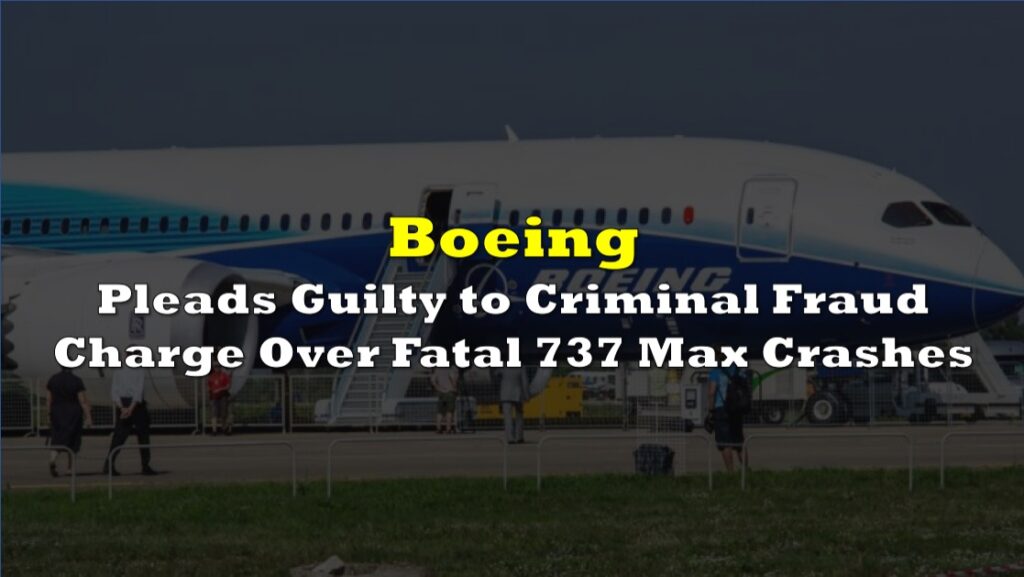The Boeing Company (NYSE: BA) is flying into a turbulence of publicity nightmares.
The Securities and Exchange Commission charged the firm and its former CEO, Dennis A. Muilenburg, with antifraud violations after its investigation showed that the airplane manufacturer misrepresented the safety of its 737 MAX. The particular Boeing model has been in two fatal crashes just five months apart: Lion Air Flight 610 in October 2018 and Ethiopian Airlines Flight 302 in March 2019. Both incidents killed a total of 346 passengers.
Without admitting the findings, the firm and its former chief consented to cease-and-desist orders that include penalties of US$200 million and US$1 million, respectively.
The latest development follows almost two years after the company settled a separate US$2.5 billion fraud charge with the Justice Department–still related to its attempt to misrepresent the cause of the fatal crashes. This settlement includes US$1.77 billion in reimbursement to the airlines that sustained the faulty Boeing model that crashed, US$500 million in compensation for families of the crash victims, and US$243.6 million in penalties.
Then, on the same day, a Boeing 777-200 model being flown by United Airlines experienced a “hydraulic pump issue,” with spectators reporting sparks flying out of the aircraft’s left wing. The plane, carrying 256 passengers, was forced to return back to Newark’s Liberty International Airport shortly after taking off.
United 777 returns safely to Newark Airport following a technical issue, reportedly a problem with its hydraulics. A photo appeared on social media of suspected falling debris from the aircraft.
— Breaking Aviation News & Videos (@aviationbrk) September 22, 2022
📹 variablecraft pic.twitter.com/oezAkaFaJK
The aircraft is 26 years old, according to Cirum fleets data. While this is mostly an issue of oversight on United’s part–a similar incident happened in February 2021 involving in-flight engine failure–the timing of it couldn’t have been worse for Boeing.
The Federal Aviation Administration said the aircraft landed safely and they will investigate the incident.
SEC: “They misled investors”
At the center of SEC’s findings is Muilenburg advertising 737 MAX’s safety despite knowing fully well that a flight control function called the Maneuvering Characteristics Augmentation System (MCAS) posed an ongoing issue then.
“The Boeing Company and its former CEO, Dennis Muilenburg, failed in this most basic obligation [to provide full, fair, and truthful disclosures]. They misled investors by providing assurances about the safety of the 737 MAX, despite knowing about serious safety concerns,” said SEC Chair Gary Gensler.
One month after the Lion Air Flight 610 crash, Muilenburg is said to have edited and approved a press release “that selectively highlighted certain facts from an official report of the Indonesian government suggesting that pilot error and poor aircraft maintenance contributed to the crash.”
He further assured the safety of 737 MAX, saying it is “as safe as any that has ever flown the skies” even if he knew that an internal safety review already said the MCAS posed an ongoing “airplane safety issue” and that Boeing was already redesigning the system to address it.
A few months later, the Ethiopian Airlines Flight 302 crashed, leading to international regulators grounding the entire 737 MAX fleet. Six weeks after, Muilenburg told analysts and reporters that “there was no surprise or gap . . . that somehow slipped through [the] certification process” for the 737 MAX, despite being aware of contrary information.
“Boeing and Muilenburg put profits over people by misleading investors about the safety of the 737 MAX all in an effort to rehabilitate Boeing’s image following two tragic accidents that resulted in the loss of 346 lives and incalculable grief to so many families,” said Gurbir S. Grewal, Director of the SEC’s Enforcement Division.
Related to the penalties, a fair fund will be established for the benefit of harmed investors. The payment is expected to take a hit on Boeing’s bottomline, which just notched a net income of US$193 million after three quarters of losses.
The firm’s financials has just also started to rebound from the fatal crashes and the grinding halt during the pandemic, recording US$16.68 billion in Q2 2022 vis-a-vis Q1 2022’s US$13.99 billion and Q2 2021’s US$17.00 billion. However, the firm is still over-leveraged with total liabilities of US$150.27 billion against total assets of US$135.48 billion.

The Boeing Company last traded at US$131.26 on the NYSE, down 5.37% during Friday’s session.
Information for this briefing was found via SEC, Flight Global, and the sources mentioned. The author has no securities or affiliations related to this organization. Not a recommendation to buy or sell. Always do additional research and consult a professional before purchasing a security. The author holds no licenses.









